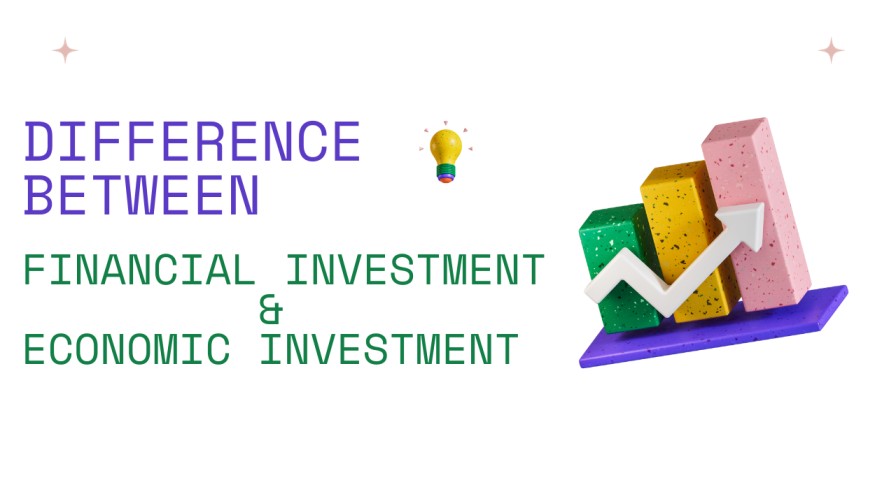Introduction
In the intricate world of finance and economics, distinguishing between financial investment and economic investment is essential. This article aims to delve deeper, exploring the key characteristics that define each term and contribute to their unique roles.
Definition of Financial Investment and Economic Investment
Before we explore the intricacies, let’s establish clear definitions. Financial investment involves allocating funds into assets like stocks, bonds, or real estate, anticipating future financial gain. Economic investment, on the other hand, entails spending on capital goods, such as machinery or infrastructure, to enhance overall economic productivity. [What is the difference between financial investment and economic investment]
Importance of Investments
Key Characteristics Explored
Unraveling the key characteristics of financial and economic investments is crucial for a comprehensive understanding:
- Objective:
- Financial Investment: Primarily seeks returns and profits for the investor.
- Economic Investment: Aims at enhancing a nation’s long-term production capabilities.
- Time Horizon:
- Financial Investment: Often short-term with a focus on quick returns.
- Economic Investment: Involves patient, long-term strategies for sustained growth.
- Nature of Assets:
- Financial Investment: Involves liquid assets like stocks and bonds.
- Economic Investment: Committed to non-liquid assets such as infrastructure and education.
- Risk and Return Profile:
- Financial Investment: Higher potential returns come with higher risks.
- Economic Investment: Focuses on stable, long-term growth but may lack immediate returns.
- Purpose:
- Financial Investment: Serves individual or corporate wealth accumulation.
- Economic Investment: Aims at contributing to the overall development of a nation’s economy.
Types of Financial Investments
Navigating the financial landscape requires an understanding of various investment types:
- Stocks: Ownership in a company, often with voting rights.
- Bonds: Lending money to governments or corporations in exchange for periodic interest payments.
- Real Estate: Investment in property for potential appreciation or rental income.
Types of Economic Investments
- Infrastructure: Building roads, bridges, and public facilities to stimulate economic growth.
- Research and Development: Investment in innovation for long-term economic progress.
- Education: Developing human capital for a skilled and productive workforce.
Risk and Return
Exploring risk and return is pivotal for investors:
- Financial Investments: Higher potential returns often come with a corresponding increase in risk.
- Economic Investments: Although the returns might be gradual, they contribute to stable, long-term growth.
Factors Influencing Economic Investments
Several factors impact economic investments:
- Government Policies: Legislation and policies can either encourage or hinder economic investments.
- Technological Advancements: Innovations can drive economic investments in research and development.
- Global Economic Conditions: The overall economic climate can influence the success of economic investments.[What is the difference between financial investment and economic investment?]
Time Horizon
Understanding the time element is crucial:
- Financial Investments: Can yield returns quickly, allowing for more dynamic investment strategies.
- Economic Investments: Demand a patient approach, waiting for sustained and gradual growth.
Liquidity
Financial investments offer liquidity, allowing quick conversion to cash. Economic investments involve committed, non-liquid assets, requiring a long-term perspective.[What is the difference between financial investment and economic investment?]
Role in Economic Growth
Comparison and Contrast
Financial and economic investments play complementary roles:
- Financial Investments: Propel financial markets and facilitate individual and corporate wealth accumulation.
- Economic Investments: Lay the foundation for sustainable economic development, contributing to long-term national prosperity.
FAQs: Financial Investment
Q1: Is real estate a financial or economic investment?
Real estate can be both. Buying a house for personal use is an economic investment, while purchasing property for rental income is a financial investment.
Q2: What factors determine the success of financial investments?
Success in financial investments depends on market conditions, diversification, and thorough research.
Q3: Can economic investments lead to immediate returns?
No, economic investments are generally long-term strategies contributing to gradual economic growth.
FAQs: Economic Investment
Q1: Are government expenditures considered economic investments?
Yes, government spending on infrastructure and development is a form of economic investment.
Q2: How does economic investment impact unemployment?
Investments in education and skill development can reduce unemployment by creating a more qualified workforce.
Q3: Can economic investments fail?
Yes, factors like inefficient planning or external economic shocks can lead to the failure of economic investments.
Conclusion
In unraveling the difference between financial and economic investments, it’s evident that each plays a unique role in shaping our financial and economic landscapes. Balancing both types is crucial for individual and national prosperity.[What is the difference between financial investment and economic investment?]






